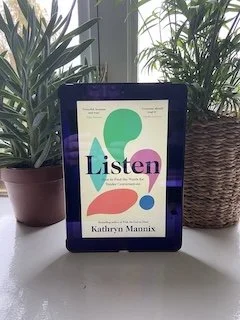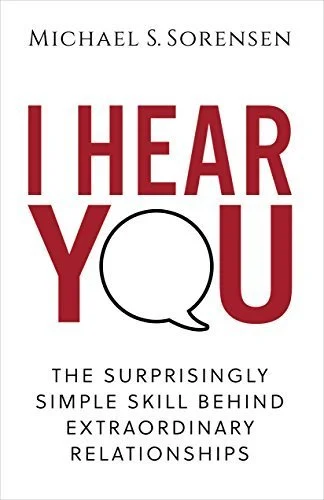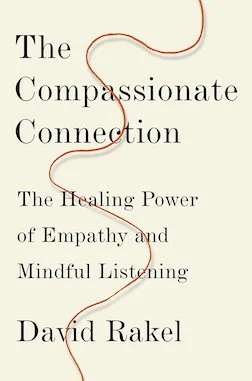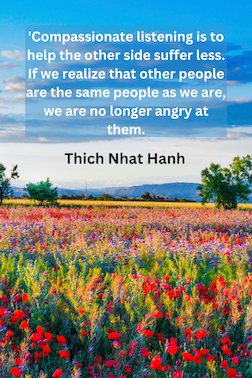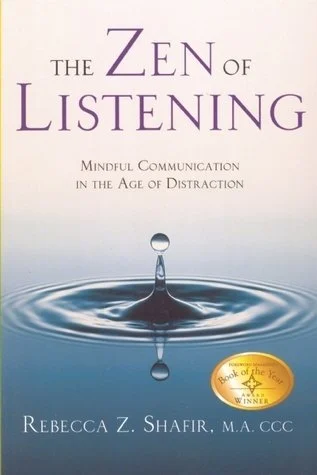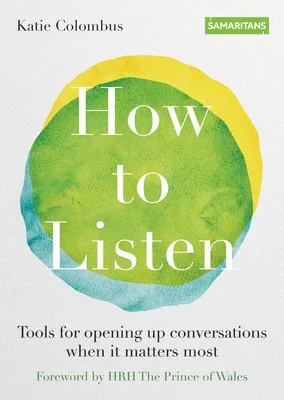Books about Listening
Many of us think we are engaged listeners. Letting the other person speak, nodding when we need to, and paying just enough attention to be able to respond to what they are saying. But the reality is that many of us don't know the difference between active vs passive listening.
It's estimated that we spend 60% of our time in conversation listening (though we all know people where it feels closer to 99%) and research has shown that we only recall 25% of what's said. How many times do you ask yourself - Am I listening? If you have to ask, probably not.
This figure isn't that surprising when you think about how we listen. We pick out the parts that interest us and hear what we want to hear. We tune out because we find a lot of it boring - it doesn't concern us. And we spend a lot of time thinking over in our heads what we are going to say when the other person stops talking.
We're never really fully present or connected with the other person. Our active listening skills are lacking; it has become something of a lost art.
Everyone knows the feeling of being truly listened to. We seem to have lost the ability to be a good pair of ears so I’ve compiled a list of books about listening I’ve read over the years that hopefully help to remedy that.
Kathryn Mannix - Listen: How to find the words for tender conversation.
With over thirty years of experience working in palliative care as a physiotherapist, doctor, and trainer, Kathryn Mannix has developed her listening skills right at the coal face. And 'Listen - How to Find the Tender Words for Conversation' is one of the most compassionate and empathetic books about listening you will read.
Because Kathryn has spent her life in the field, she can use plenty of examples throughout the book on active listening skills. Particularly revealing are the conversations she has with the dying, and she is also honest enough to admit the mistakes she has made. Effective communication skills are like anything else - we have to develop them
We all tend to want to jump in when someone is talking, to try and offer help; this is a normal human reaction. But as Kathryn explains, it's the opposite of useful. Listening is not waiting impatiently for someone to finish speaking so you can offer your advice. It's ok to be present, to be silent.
This is one of those wise books that can help you to become an engaged listener. It's full of useful advice, backed up by someone with experience in the field, who can share their knowledge compassionately and thoughtfully.
You're not listening by Kate Murphy
When did you last really listen to someone? Not interrupting, offering unasked-for advice, or worst of all, glancing at your phone. When it comes to listening, many of us have the worst of habits but perhaps it's because we've never been told how to listen properly.
Sometimes it seems like we are surrounded by talkers. Listening with an open heart, waiting to hear what the person is going to say without preconceived notions and not jumping in with unasked-for advice - it often feels like there is a dearth of good listeners. For those of us lucky to have one in our lives, they are a friend to treasure.
Kate Murphy talks to a wide range of people, from priests to bartenders, neurologists, and CIA agents, to find out what makes for effective communication and a good listener. You get a sense of listening as a skill, something that we can get better at. It's a tool that we can sharpen with practice, but we have to know how to get better at it first.
A barrier to active listening that is emphasised in this book and others, is body posture. When you’re listening to someone, are you slouched over, looking away from the speaker, generally looking disinterested. Look at your body shape, the physical cues you are giving and see if you encourage people to feel that you are an active listener.
Using psychology, neurology, and looking at popular culture, Kate Murphy makes this a fascinating and engaging read. It's also interspersed with tips on how to be a better engaged listener, making it one of those books about listening that can genuinely help.
I Hear You: The Surprisingly Simple Skill Behind Extraordinary Relationships by Michael S. Sorensen
This is a short book on listening packed with helpful information on improving your communication skills. It's also written in a language that is accessible and easy to understand, and even if you consider yourself to be an engaged listener there are plenty of tips to become even better at it.
One of the interesting skills discussed in 'I hear you' is the idea of 'validating' the other person in the conversation. When the speaker is angry, it's important to show empathy and to say 'I can see that you are upset', or 'This is what I'm hearing you say'. You don't have to agree with the person - it's just important to acknowledge their emotions or point of view.
When someone is having a bit of a rant, they're not necessarily looking for you to agree with them. What they want is to be understood, for someone to acknowledge where they are coming from. The important thing from a listener's perspective is to understand where these emotions are coming from and then to empathise with them. And if you're unsure of the best thing to say, the author provides some example situations in the final chapter.
There isn't a word wasted in this book. It presumes that you are reading because you want to improve your listening, and doesn't add any unnecessary waffle. Some self-help books can feel padded out with useful information stretched out into a longer volume, but it's not the case in this super useful books on listening.
The Compassionate Connection: The Healing Power of Empathy and Mindful Listening by David Rakel
When it comes to listening, I think one of the most integral connections we can have with another person is empathy. Often, we listen to someone else's pain or suffering but we don't know what to do. We want to offer our own experience of the same suffering or tell them what we think they should do to cope, but that isn't what the person is after.
It's a common thread throughout this list of books about listening, but it's worth repeating that being there is enough. Make a cup of tea, prepare a nice meal, but just be with the person and listen. A lot of this isn't rocket science but I think we have forgotten about the importance of compassionate awareness, just literally sharing a space with someone. Ask yourself - are you listening? Are you present and aware and not lost in your own internal thought merry-go-round.
Withholding the desire to give advice or to judge is one of the tips that David Rakel, founder of the program of integrative medicine at Wisconsin University, making this a useful book on active listening. He also highlights the importance of looking at someone when they talk, which sounds simple but is an often overlooked communication skill; it's been proven to help both mentally and physically, as you are acknowledging the speaker's pain.
The author is also able to list examples from his own career of how he has used his listening skills, and is humble enough to share those times that he didn't and how he learned from this. It's an especially useful book for those in caring professions such as medicine and social work etc and one of the things he does talk about which I found useful is how to avoid burnout - the listener needs to look after themselves as well. Compassionate care starts with self-care.
This book is a mixture of practical advice, backed up by scientific research and personal experience, to help anyone who wants to be a better, deeper, more engaged listener. It recommends a variety of mindfulness techniques, helping you to remain present with listeners. And the loving-kindness meditation that is included is especially useful for increasing empathy.
The Zen of Listening: Mindful Communication in the Age of Distraction
It can be hard to listen in this world we find ourselves in, as there are so many distractions. From the bombardment of social media, phones, tv, radio, and traffic - it can be hard to find the mental space to just listen. It's no surprise that our listening skills have deteriorated, but this book can help us to do just that again.
Rebecca Shafir is an experienced Speech and Language therapist, and this book is full of practical advice on effective communication techniques, backed up by science and interspersed with her own experiences on how she helped people to communicate again, including those who have had a stroke. It's also written in a cosy, personal style, almost like you are listening to a therapist.
This is a little different from the other books about listening that I have listed because it centers the skill within the practice of mindfulness. As someone with an interest in Buddhism, I was interested in how the author related it to listening and it made a lot of sense to me: Some people see zen or mindfulness as empty buzzwords, but her message can be summed up quite simply:
Our goal in becoming mindful listeners is to quiet the internal noise to allow the whole message and the messenger to be understood…listening is a gift we give to others.
Like a number of the books on this list, this isn't a title to read in one go and to put aside. It's one to put on the shelf and return to over and over again; as I said earlier, it's a lifelong skill that you have to work on to keep it sharp. Your relationships will be all the better for the work you have put into your listening skills.
How to Listen: Tools for Opening up Conversations when it matters most by The Samaritans and Katie Colombus
When it comes to listening, 'The Samaritans' could write a book about the subject. And along with Katie Colombus, this is exactly what the organisation has done here, in this super useful book on active listening full of tips and techniques. It will allow you to improve relationships with family, friends, and colleagues by developing your listening skill, resulting in more effective communication skills.
This is a wonderfully practical book, well laid out and easy to read. The language is familiar and conversational, and the illustrations are a nice touch.
The range of situations and various voices used in the examples feel real. You see the difference that lifting the phone and calling the samaritans has made to people's lives. They are a reminder that no matter what you are going through, you are never alone.
You get a sense in this book of the healing that takes place when a person feels that they are being heard. It's also good at explaining the difference between active vs passive listening skills. It also helps you understand the concepts described, allowing you to become a more engaged listener
This is one of those books about listening that should be in every school, workplace, every home. It will also give you the confidence in your newly found listening skills to approach friends, family, or even strangers and ask them the three little words that can make such a difference to a person's life: Are you alright?
So that's my list of books about listening that I have found useful. The difference between active vs passive listening is that we don't just sit there nodding, never responding or asking questions. We engage with the speaker, showing empathy and understanding and letting them know that we are present and aware.
Listening is something I believe I'm good at - I've completed a basic counselling course, and still remember some of the basics. I like to try and pay attention when someone is talking, trying not to interrupt and to be active and ask questions. But after reading these books, I realise that listening skills are a tool that I need to continually sharpen, and I have a lot of learning to do, and definitely need to read a few more books on active listening.
I’m continually asking myself - am I listening? One of the things that I do on a daily basis is ground myself in the body when I’m listening to someone. I tap into the feeling of my feet on the ground, maybe where my body is resting if I’m sitting - any physical sensations. It all helps to keep more present.
A barrier to active listening is our constant thought stream. We can be having a conversation with someone in the present, whilst there’s a thought stream going on in the head about something completely different. We all know that distant look that someone has behind their eyes. Being aware of this is the first part of tackling the problem, and becoming present.
Brushing up on these communication skills is something we can all do, improving our relationships with friends, family, and colleagues. Maybe if we were better listeners we would be able to understand one another better, and there would be less conflict and we would live in a more empathetic society.
Other lists
Books about The Healing power of nature
Books about human strength and courage
Books to chill with in the winter
Books on meditation and mindfulness



